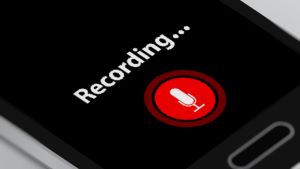630-462-9500
After Hour New Client Telephone Number 630-690-6077
1776 S. Naperville Road, Building B, Suite 202,
Wheaton, IL 60189
Can I Record a Conversation with My Spouse for Evidence in My Divorce?
 If you are like the vast majority of adults in Illinois, you probably have a cell phone, computer, tablet, or all three. Most of these devices can record audio and video at the press of a button. It can be very tempting to make use of this ability during divorce – especially if your spouse’s behavior is much different behind closed doors than it is in public. You may wonder, “Can I record my spouse and use this recording as evidence during my divorce?”
If you are like the vast majority of adults in Illinois, you probably have a cell phone, computer, tablet, or all three. Most of these devices can record audio and video at the press of a button. It can be very tempting to make use of this ability during divorce – especially if your spouse’s behavior is much different behind closed doors than it is in public. You may wonder, “Can I record my spouse and use this recording as evidence during my divorce?”
Illinois Law Regarding Recording a Conversation
Most states are one-party consent states. This means that it is lawful to record a conversation between two people if at least one of them knows that the conversation is being recorded. For example, you could record yourself speaking on the phone to someone else because you know that you are recording. Illinois, however, is an all-party consent state. This means that both you and the other party need to provide consent for a recording to be legal. Recording someone without their permission may be considered a Class 4 felony offense in Illinois. However, there are several exceptions to Illinois laws regarding eavesdropping and recording.
Defining “Surreptitious” in the Context of Eavesdropping
In 2014, the Supreme Court of Illinois ruled that the eavesdropping statute was unconstitutional. The law has since been amended. You may not record conversations if the conversation takes place in public, and the participants have no reasonable expectation of privacy. However, you may record conversations that are open and obvious. Eavesdropping is now defined as overhearing or recording private conversations without consent in a “surreptitious manner.” This means obtaining a recording via “stealth or deception” or recording through “secrecy or concealment.”
Leave the Detective Work to Your Divorce Lawyer
As you can see, Illinois law regarding recording and eavesdropping is complicated. You may violate the Illinois eavesdropping statute without even realizing it. Therefore, it is best to leave the detective work to your divorce lawyer. He or she will understand the types of evidence that will be useful during your divorce case and how to obtain this evidence lawfully. For example, your lawyer may use written interrogatories to obtain answers from your spouse under oath. He or she may also ask your spouse to attend a deposition in which the conversation will be recorded by a court reporter. If necessary, subpoenas may be used to obtain text messages or cell phone records.
Contact a DuPage County Divorce Lawyer
If you are getting divorced, the knowledgeable Wheaton divorce attorneys at The Stogsdill Law Firm, P.C. can provide strong legal advocacy and support during your case. Call 630-462-9500 for a confidential, personalized consultation.
Source:
https://www.ilga.gov/legislation/ilcs/documents/072000050K14-1.htm




















